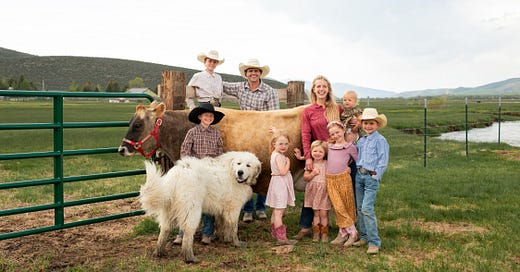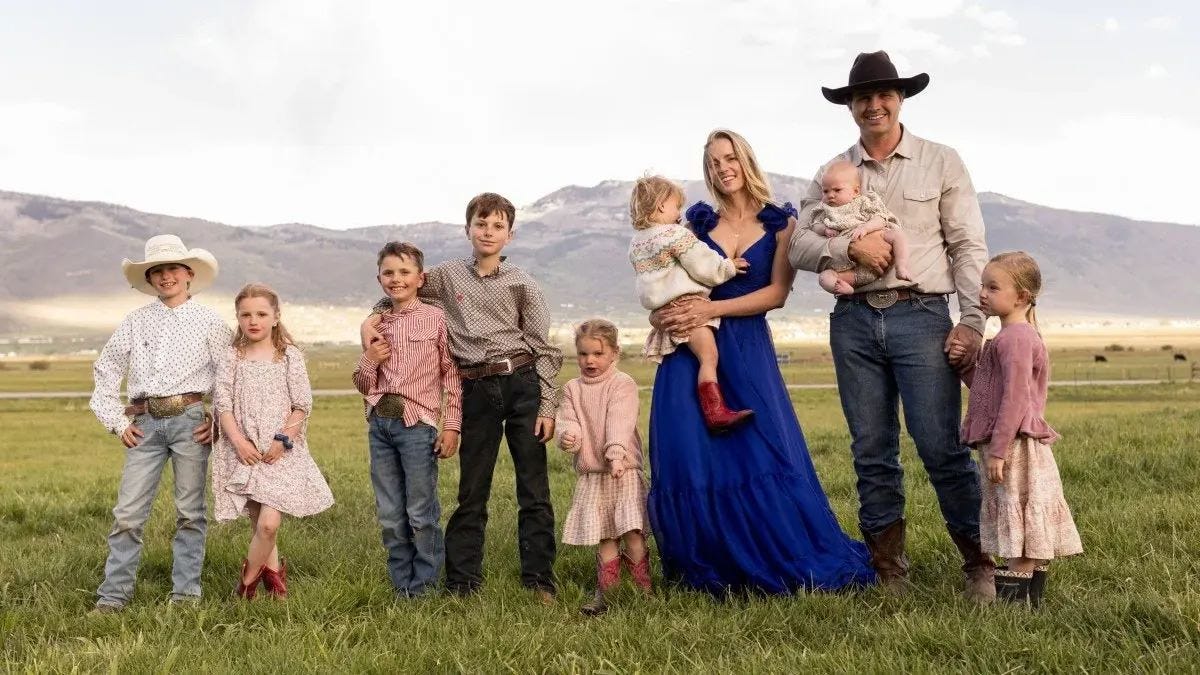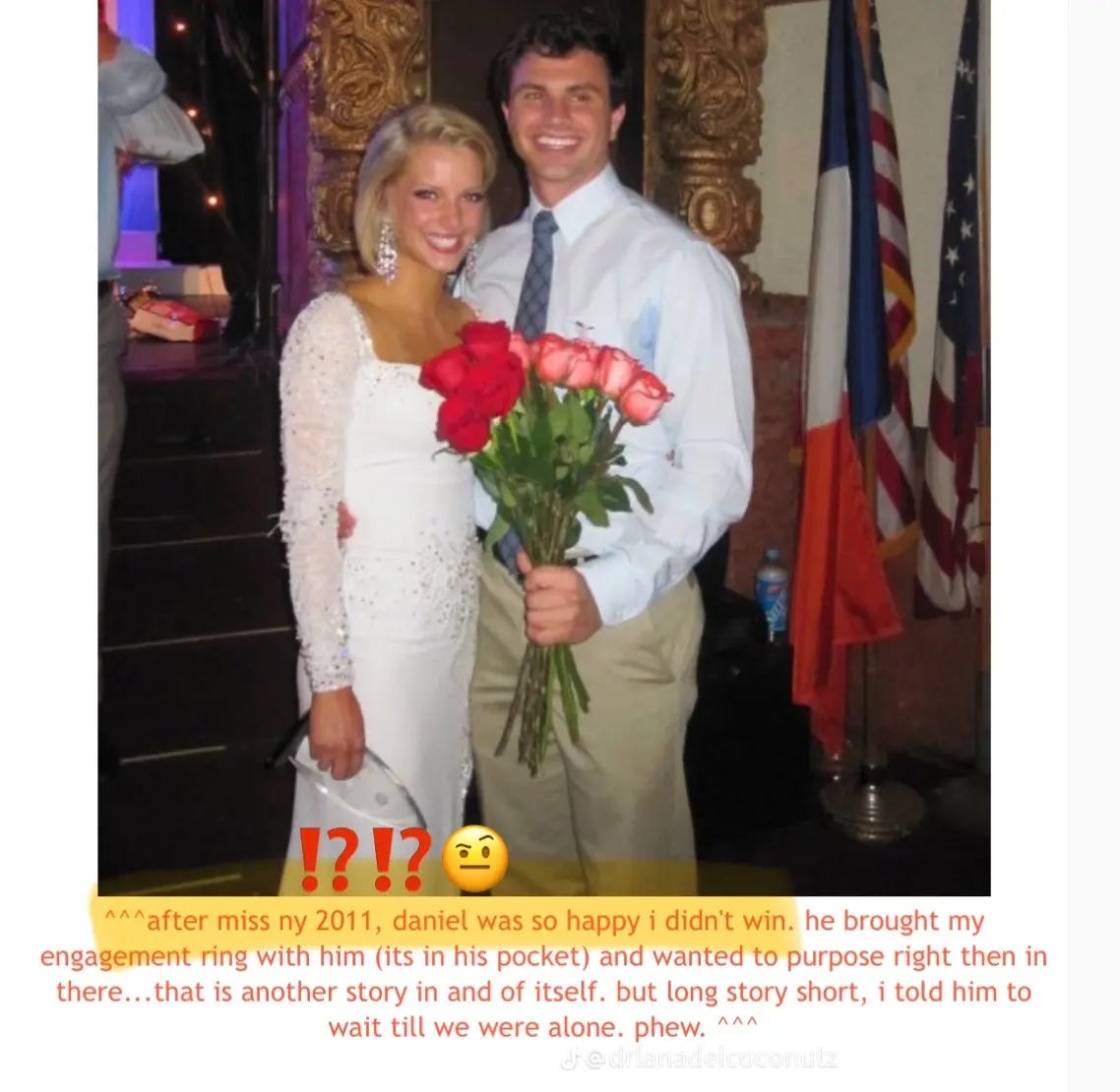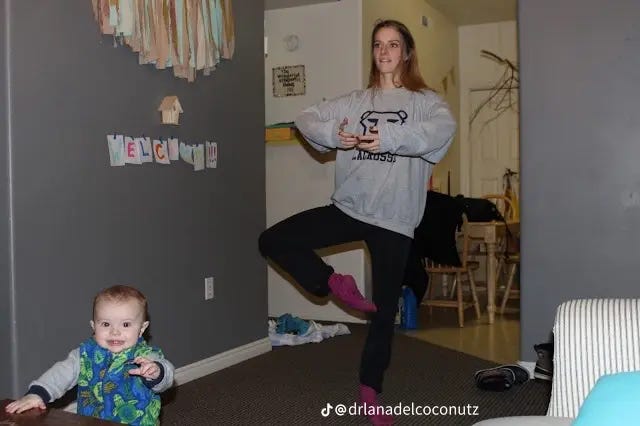Elite Theory vs. Trad LARP
Ballerina Farms Controversy as the backdrop to the ancient conflict between living the pastoral life and embracing a natural social hierarchy
I used to be a trad LARPer. It started in my teens with a wistful desire to live a fantasy version of 1950s Americana. When that fell apart (read: my high school sweetheart, whom I dreamed of marrying after graduation, dumped me for a redhead), I was whisked off to Never Never Land, aka NET Ministries, for a year of Catholic missionary work that, while a worthy cause, messed up my conception of God’s will for a woman’s life so badly I’ve made some irreparable mistakes in its wake. (Thank God I read “Atlast Shrugged” a few years later; it broke me out of my trance.)
From Cicero to Hannah Neeleman, there is a several-thousand-year discourse on which lifestyle is best: the aristocrat, or the homesteader. To be fair, many landed gentry had plantations that hired help (or had serfs or slaves) to execute the daily functions of backbreaking manual labor for them. But a uniquely American concept, which aligns well with the idea of democracy, was the pioneer, the open frontier, and the Homestead Act, which gave the everyman and his wife the ability to pick a plot of wilderness and farm it on their own. This allowed for widespread property ownership, leading to greater equality among the populace - the backbone of a successful republic.
“The Industrial Revolution and its consequences have been a disaster for the human race.”
To those who love the “trad” lifestyle, I applaud you and recognize our need for you. In a perfect world, the majority of Americans would probably live on self-owned and self-operated small family farms, or at least have some chickens and a garden in their backyard. It’s healthier, more sustainable, and better for the sake of personal liberties. (There’s a reason Ted Kaczynski wrote “Industrial Society and Its Future”.) I sympathize heavily with victims of governmental tyranny: Ruby Ridge, Waco, the Cliven Bundy standoff, and Sackett v. EPA, just to name a few. I have always deeply respected and admired the “Little House on the Prairie” lifestyle for the humility, self-sufficiency, and work ethic it engenders. However, there comes a time when a person has to admit that they may have been made for more than milking a cow and baking sourdough bread. There are those of us who were not made for backbreaking manual labor day in and day out. It’s no one’s fault, it’s just a matter of an individual’s nature, determined by Our Creator.
Which brings me to the Ballerina Farms controversy.
You probably already know the story: Hannah Neeleman, the pretty tradwife face of popular social media account “Ballerina Farms”, was a ballet student on a full ride at Julliard when she got engaged to a billionaire’s son after a month of dating, was married two months later, and pregnant a month after that, causing her to drop out of school, give up ballet altogether, birth eight children, and reside on a farm where she does quite literally all of the cooking, cleaning, homeschooling and childrearing, and much of the farm work, too. She also competes in beauty pageants, to her credit; not every woman can balance such extreme opposites in lifestyle. Candace Owens applauds her for having it all: the tradwife life, the career woman life.
“If I ever won the lottery, I won’t tell anybody. But there will be signs."
Let’s set the record straight: Hannah Neeleman has a husband who is the heir to a billion-dollar company. She and her husband are successful entrepreneurs making lots of money off of their farm and lifestyle content. She wins pageants, has a big beautiful family, and has the blessing of a gorgeous plot of land near the mountains. Anyone in their right mind would say that’s quite the fairytale.
And it is just that: a fairytale. Because there are signs of trouble in paradise. To highlight just a few, I’ll link videos of her disappointment when her rich husband gets her an egg apron for her birthday instead of the plane tickets to Greece she so clearly asked for and wanted (his dad owns an airline; you think he couldn’t get those tickets for free?); I’ll add photos of her old blog from when she first got married; and I’ll include her quotes from The Times article recently published on her. Altogether, they paint an eerie and disturbing picture - one that hit a little too close to home with me because I myself almost fell into the same trap.
Some quotes from the article interviewing Hannah:
We drive past the dairy cows, looking out across a river valley and the arid mountains beyond. Was this what she always wanted, I ask when we get a moment alone, while Daniel checks on the animals. “No,” she says. “I mean, I was, like —” She pauses. “My goal was New York City. I left home at 17 and I was so excited to get there, I just loved that energy. And I was going to be a ballerina. I was a good ballerina.” She pauses again. “But I knew that when I started to have kids my life would start to look different.”
At 14 she went to summer school at Juilliard, returning for her undergraduate degree, which she paid for by competing in “scholarship pageants” — beauty pageants that offer academic scholarships or sometimes tuition money to winners.
“Our first few years of marriage were really hard, we sacrificed a lot,” she says. “But we did have this vision, this dream and —” Daniel interrupts: “We still do.” What kind of sacrifices, I ask her. “Well, I gave up dance, which was hard. You give up a piece of yourself. And Daniel gave up his career ambitions.”
I look out at the vastness and don’t totally agree. Daniel wanted to live in the great western wilds, so they did; he wanted to farm, so they do; he likes date nights once a week, so they go (they have a babysitter on those evenings); he didn’t want nannies in the house, so there aren’t any. The only space earmarked to be Neeleman’s own — a small barn she wanted to convert into a ballet studio — ended up becoming the kids’ schoolroom.
Daniel says, Neeleman sometimes gets so ill from exhaustion that she can’t get out of bed for a week.
She also gave birth to [her children] without pain relief. None at all? She shakes her head. Why? “I don’t know, I just have never loved taking it.” She stops herself. “Except with Martha — I was two weeks overdue and she was 10lb and Daniel wasn’t with me … ” She lowers her voice. Daniel is currently out of the room taking a phone call. “So I got an epidural. And it was an amazing experience.” Where was Daniel that day? “It was shipping day [for the meat boxes] and he was manning the crew.” But the epidural was kind of great? She pauses — and smiles. “It was kinda great.”
I can’t, it seems, get an answer out of Neeleman without her being corrected, interrupted or answered for by either her husband or a child. Usually I am doing battle with steely Hollywood publicists; today I am up against an army of toddlers who all want their mum and a husband who thinks he knows better.
And the sequined [pageant] gowns? Well, they used to be in her bedroom cupboard, but with all of her stuff — and Daniel’s and Henry’s and Charles’s and George’s and Frances’s and Lois’s and Martha’s and Mabel’s and Flora’s — the cupboard got so full that there wasn’t any more room. So Daniel put them in the garage.
Are you seeing what I’m seeing? Here is a woman so beautiful she won Mrs American in 2023 - so talented she got a scholarship to Julliard for ballet - yet she’s now so exhausted she sometimes can’t get out of bed for a week; her home ballet studio got converted to a classroom; she has to sneak epidurals behind her husband’s back when giving birth; and her gorgeous gowns are in the garage. Her husband was, quote, “so happy [she] didn’t win” her Miss NY pageant that he bought her an engagement ring and wanted to propose right then and there. She burned pancakes and had to remake them to her husband’s liking. She didn’t have a car and would be stranded alone at her house for days on end and get depressed. And if you watch her TikTok videos, she still dances every chance she gets, just for the sheer joy of it, then the light leaves her eyes the second she stops. Everywhere in her house are paintings of dancers. She named her farm after the passion she quit for it. How much more sad could this story be?
The reason I relate to her is in 2022 I had a fiance and also ran for state representative. When I lost he was so happy, he literally told me so - “I’m glad you lost, I was hoping you’d lose” - and I heard him repeatedly say over the course of the campaign “I can’t wait for this to be over”. After it ended, he screamed at me something akin to, “You’re done with politics forever! I never want to hear about it again! Say goodbye to your political friends. No more meetings, no more campaigns, no more activism! It’s over! Politics are never to come out of your mouth again! You’re staying home with the kids and that’s it for the rest of your life!” (I’m not kidding. This is not a parody or a caricature. He really yelled this at me.) And I recall a day when I made pancakes for him slightly too dark brown (they weren’t even burnt!), that he demanded I make an entirely new batch. When I coolly replied, “If you don’t like how I made them, why don’t you make them yourself?” he snapped back, “Do you ever want to have children? I won’t give you any if you act like that.”
Why am I writing about all of this? Because Hannah never should have become a farmgirl tradwife LARPer. She was so obviously made to dance, to be seen on stage, to be in the limelight for her beauty and her mastery of a gorgeous art, that to be relegated to mucking out stalls in the barn and slaving away over a hot stove is truly beneath her - something about it is intrinsically unjust and cries out to heaven for vengeance. She looks sickly in many of her videos. She’s so exhausted she can’t get out of bed for a week at a time. She is being worked to death. She’s clearly depressed - she even admits in on her blog.
She is physically and emotionally of an aristocratic breed, and therefore, the “Trad Life” is unsuitable for one such as her. While many women may thrive in its conditions, she is meant for something different, something higher.
I was forced to read Aristotle’s Nicomachean Ethics in college. In it, the ancient philosopher describes a hierarchy of goods. (Thomas Jefferson echoed this sentiment two thousand years later in many of his writings.) There are lower goods and higher goods - much like Maslow’s hierarchy of needs. At the bottom are the fundamental things we need to live: food, water, clothing, shelter. At the top, self-actualization (in the case of Maslow); aka Aristotle’s highest good, the life of wisdom, art, & virtue; aka Aquinas’ transcendentals, beauty, truth, and goodness. Whether you’re a classicist, a Catholic apologist, or a modern psychologist, the highest good, the greatest end, remains the same. And those who are capable of achieving that highest good - Jefferson’s “natural aristocracy” - have a duty and obligation to fulfill it, for their own sake, for the sake of their country, for the sake of humanity, and even for the sake of Christ.
14.) For even as a man going into a far country, called his servants, and delivered to them his goods; 15 And to one he gave five talents, and to another two, and to another one, to every one according to his proper ability: and immediately he took his journey.
16 And he that had received the five talents, went his way, and traded with the same, and gained other five. 17 And in like manner he that had received the two, gained other two. 18 But he that had received the one, going his way digged into the earth, and hid his lord's money. 19 But after a long time the lord of those servants came, and reckoned with them. 20 And he that had received the five talents coming, brought other five talents, saying: Lord, thou didst deliver to me five talents, behold I have gained other five over and above.
21 His lord said to him: Well done, good and faithful servant, because thou hast been faithful over a few things, I will place thee over many things: enter thou into the joy of thy lord. 22 And he also that had received the two talents came and said: Lord, thou deliveredst two talents to me: behold I have gained other two. 23 His lord said to him: Well done, good and faithful servant: because thou hast been faithful over a few things, I will place thee over many things: enter thou into the joy of thy lord. 24 But he that had received the one talent, came and said: Lord, I know that thou art a hard man; thou reapest where thou hast not sown, and gatherest where thou hast not strewed. 25 And being afraid I went and hid thy talent in the earth: behold here thou hast that which is thine.
26 And his lord answering, said to him: Wicked and slothful servant, thou knewest that I reap where I sow not, and gather where I have not strewed: 27 Thou oughtest therefore to have committed my money to the bankers, and at my coming I should have received my own with usury. 28 Take ye away therefore the talent from him, and give it to him that hath ten talents. 29 For to every one that hath shall be given, and he shall abound: but from him that hath not, that also which he seemeth to have shall be taken away. 30 And the unprofitable servant cast ye out into the exterior darkness. There shall be weeping and gnashing of teeth.
Far be it from me to suggest Hannah is going to Hell because she stopped doing ballet. Rather, the point is that God gives to each person a number of talents, and we have a mandate from Heaven to use them for the glory of God and salvation of souls. Some talents are “higher order” talents than others - slopping hogs is not as challenging or as beautiful as performing Swan Lake. If a person has the ability to do the higher order good, then she must do it. We do need to recognize the innate aristocrats among us and stop denying the reality of our natures. That doesn’t mean we give them a different set of political or civil rights; rather, it means we stop pretending they don’t exist, stop pretending that it’s shameful & pretentious to be born so highbrow. The Trad LARP is not for the natural aristocracy…that’s why it’s a LARP. The pastoral lifestyle of the humble farmer ought to be reserved for those whom it’s best suited for…and it’s simply unsuitable for gifted ballerinas, or those with a clear knack for statecraft.
To set the world aright, we ought to embrace the idea of a natural social class system again, and call upon those in each class to be the best at what God made them good at. We will all be happier and better off for it. (Eventually I’ll write about the opposing idea to this article - hyperdemocratization of elite institutions - which we often think of as modern DEI practices, but includes the Bolshevik Revolution and the overthrow of the Christian monarchs of Europe in WW1. But first, I must read more Alexis de Tocqueville :)
To read more about Elite Theory, click here.











Well said, Jacky!